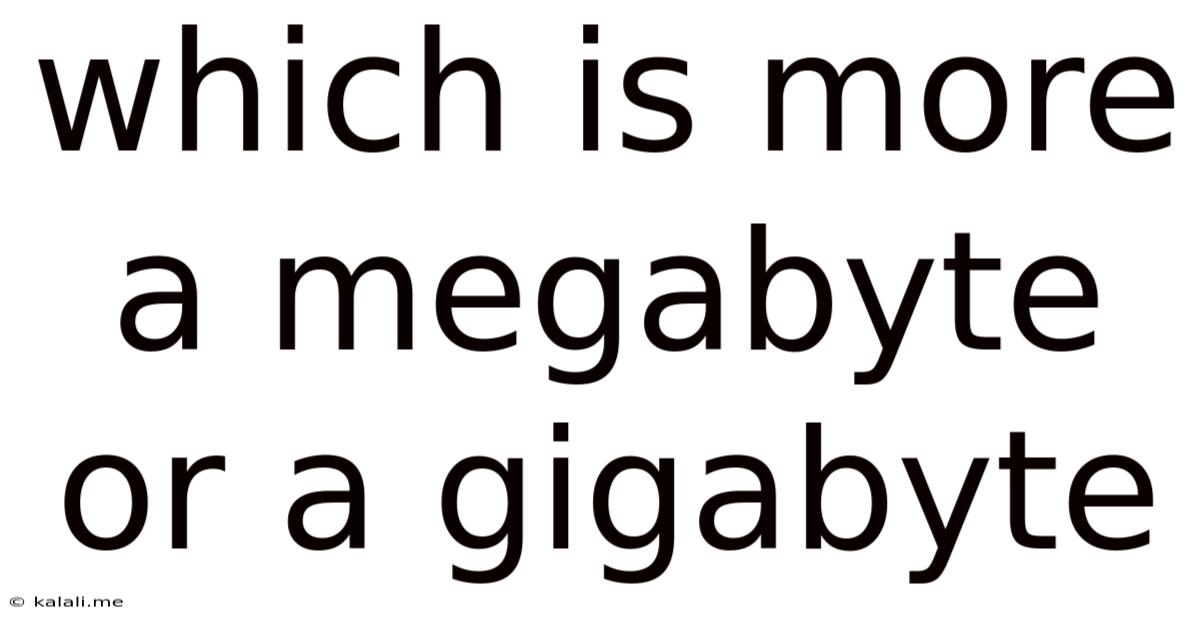Which Is More A Megabyte Or A Gigabyte
Kalali
Jun 11, 2025 · 3 min read

Table of Contents
Megabyte vs. Gigabyte: Understanding Data Storage Units
Understanding the difference between a megabyte (MB) and a gigabyte (GB) is crucial in today's digital world, where we constantly deal with files, storage capacities, and internet speeds. This article will clarify the relationship between these units, explain their practical implications, and help you navigate the complexities of digital data measurement.
What are Megabytes and Gigabytes?
Both megabytes and gigabytes are units of digital information storage capacity. They represent multiples of a byte, the basic unit of digital information. A byte is typically represented by 8 bits (binary digits, 0 or 1). The difference lies in their magnitude:
-
Megabyte (MB): One megabyte is equal to 1,048,576 bytes (2<sup>20</sup> bytes). Think of it as a relatively small unit of data. A typical song file might be a few megabytes in size.
-
Gigabyte (GB): One gigabyte is equal to 1,073,741,824 bytes (2<sup>30</sup> bytes). This is significantly larger than a megabyte; in fact, it's 1024 megabytes. High-definition movies, large software applications, and extensive game files often measure in gigabytes.
The Relationship: A Simple Analogy
Imagine a library. A megabyte is like a single bookshelf, containing a limited number of books. A gigabyte, on the other hand, is like an entire library, containing many bookshelves (megabytes) filled with numerous books (data).
Practical Implications and Examples:
- Storage Devices: Hard drives, SSDs, and USB flash drives are commonly measured in gigabytes and terabytes (TB, which is 1024 GB).
- File Sizes: Images, documents, videos, and software installations all have different file sizes, ranging from kilobytes (KB) to terabytes.
- Internet Speeds: Internet service providers often advertise speeds in megabits per second (Mbps) or gigabits per second (Gbps). Note the "b" indicating bits, not bytes. 8 bits make up one byte.
- RAM (Random Access Memory): The amount of RAM in your computer is often expressed in gigabytes. More RAM allows your computer to run more applications simultaneously and smoothly.
Choosing the Right Storage:
Understanding the difference between megabytes and gigabytes helps in selecting appropriate storage solutions. If you mostly work with documents and small images, a device with a few gigabytes of storage might suffice. However, if you deal with large video files, high-resolution images, or extensive software libraries, you'll need significantly more storage capacity, possibly several hundred gigabytes or even terabytes.
Beyond Gigabytes: Terabytes and Beyond
While gigabytes are common today, the increasing demand for data storage has led to the use of even larger units like terabytes (TB), petabytes (PB), exabytes (EB), and beyond. These units represent exponentially larger quantities of data.
In conclusion, understanding the difference between megabytes and gigabytes is fundamental to navigating the digital world. Knowing the relative sizes of these units allows for informed decisions about storage needs, data management, and efficient use of digital resources. By grasping the magnitude of these units, you'll be better equipped to handle the ever-growing volume of digital information.
Latest Posts
Latest Posts
-
How Many Months Are In A Quarter
Jul 01, 2025
-
How Much Does A 12 Pack Of Pop Weigh
Jul 01, 2025
-
How Many Shots In A Half Gallon
Jul 01, 2025
-
Someone Once Told Me The World Was Macaroni
Jul 01, 2025
-
How Long Does It Take To Walk Five Miles
Jul 01, 2025
Related Post
Thank you for visiting our website which covers about Which Is More A Megabyte Or A Gigabyte . We hope the information provided has been useful to you. Feel free to contact us if you have any questions or need further assistance. See you next time and don't miss to bookmark.